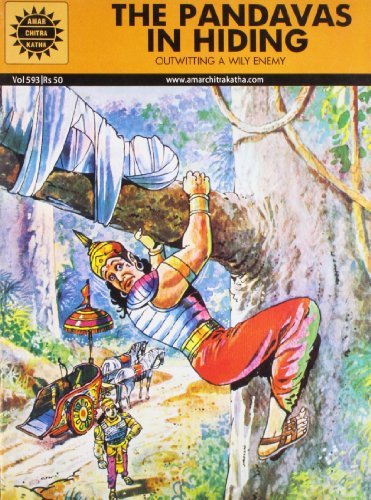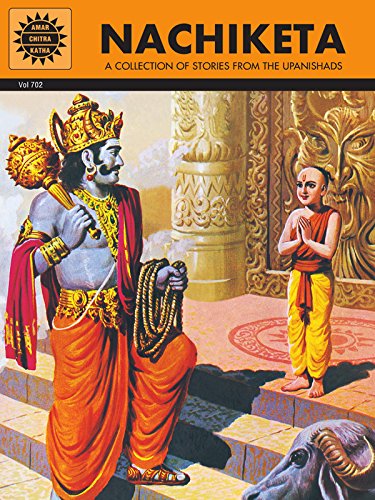-
The Pandavas In Hiding
SUBBA RAO
language (Amar Chitra Katha Pvt Ltd, April 1, 1971)King Virat’s honour was at stake and his son, Uttara, was anxious to show off his warrior skills. But faced by the enemy Kaurava hordes, Uttara’s courage vanished. It was up to his hero, the famous Pandava, Arjuna, to ensure that the young prince succeeded in his mission. And yet, Arjuna had to keep his own identity hidden, or the Kauravas would gain the upper hand.
-
Raman The Matchless Wit
SUBBA RAO
Paperback (Amar Chitra Katha Pvt. Ltd., June 17, 2001)Raman The Matchless Wit
-
Tales of Durga
SUBBA RAO
language (Amar Chitra Katha Pvt Ltd, April 1, 1971)Goddess Durga is the fierce form of Devi who, as shakti, is considered the personification of Universal energy. According to the Devi Bhagavata, the universe is but her manifestation. The worship of Durga is believed to be more than 4,000 years old in India.
-
Angulimala
SUBBA RAO
language (Amar Chitra Katha Pvt Ltd, Jan. 1, 2008)The bandit wore a gruesome garland of fingers of the men he had killed. As his garland of fingers grew longer strong men cowered in fright. The bandit was invincible - until he met a gentle monk - Buddha. Thus darkness came face to face with light and at last the restless bandit found peace.
-
Bahubali
SUBBA RAO
language (Amar Chitra Katha Pvt Ltd, Feb. 1, 2011)Bharata, king of Ayodhya, had an overriding ambition to become king of kings. He set about subduing every kingdom possible including those of his brothers. The only person to oppose his arrogance was his half-brother, Bahubali, who defeated Bharata in single combat. However, Bahubali abdicated all claims to the throne and left for the forests to meditate. Centuries later Chavundaraya, a commander-in-chief of the Ganga dynasty built a 57 feet high statue of Bahubali at Shravana Belagola. This story has been taken from Pampa's Adi Purana and Panchabana's Bhujabali Charita.
-
Nachiketa
SUBBA RAO
language (Amar Chitra Katha Pvt Ltd, April 1, 1971)Young and virtuous, Nachiketa and Satyakama had one thing in common - they sought true knowledge. The song of birds, the thunder of rain clouds, and the glow of the morning sun revealed life's secrets to Satyakama. Coming face to face with the lord of death, Nachiketa found the key to immortality. The lessons the two seekers learned were priceless, for they opened to others the door to eternal bliss.
-
Jayadratha
SUBBA RAO
language (Amar Chitra Katha Pvt Ltd, Feb. 1, 2011)Jayadratha was a despicable man - vindictive, arrogant and selfish. In the Mahabharata battle, Jayadratha had shamelessly hidden himself away, for Arjuna had taken a terrible vow to put an end to his own life if he failed to kill the villain before sunset that day. With the wise Krishna by his side, would the mighty Arjuna fail to find his mark?
-
Tales of Yudhishthira
SUBBA RAO
eBook (Amar Chitra Katha Pvt Ltd, April 1, 1971)Loyal brother, caring husband, humble victor and kind human being Yudhisthira had earned the right to eternal happiness. But he wanted his loved ones around him, and for this he was willing to endure the tortures of hell. His life was a series of tests, trials and tribulations but he never failed to rise to the occasion.
-
Chandrahasa
SUBBA RAO
language (Amar Chitra Katha Pvt Ltd, Oct. 10, 1976)The 'Jamini Bharata' is attributed to a disciple of Vyasa, Jaimini, who is also said to be the founder of the Purvamimamsa philosophy. The book is a treasure house of stories of the devotees of Lord Vishnu. Through each story the author seeks to prove that God does not forsake him who has implicit faith. The repeated attempts on the life of innocent Chandrahasa not only failed to materialise, but also finally boomeranged on the villain himself because of Chandrahasa’s implicit faith in the Lord.
-
Amrapali
SUBBA RAO
language (Amar Chitra Katha Pvt Ltd, April 1, 1971)This collection of Buddhist tales tell of Amrapali, an accomplished dancer who commanded the love and admiration of an entire town, and of Upagupta, who was just a poor monk. Amrapali craved peace; Upagupta’s bearing exuded contentment. Amrapali depended on the adulation of her audience; Upagupta spurned the attentions of the rich and famous. Their stories were different, but the Buddha’s wise teachings linked their lives – and the lessons to be learned from them.
-
The Pandavas In Hiding
SUBBA RAO
(Amar Chitra Katha Pvt. Ltd., Feb. 1, 2011)The Pandavas In Hiding - Tale from the Indian Epic, The Mahabaratha
-
Chandragupta Maurya
SUBBA RAO
(Amar Chitra Katha Pvt. Ltd., March 10, 2007)Chandragupta Maurya defeated the Nandas and established himself on the throne of Magadha in 321 B.C. It was a journey fraught with dangerous challenges but his chance meeting with the wily Chanakya changed his destiny forever. The clever Brahmin showed him how by the sheer brilliance of his wit and wile he could help the young Mauryan prince to rise from being an unknown warrior to one of the greatest emperors of India.